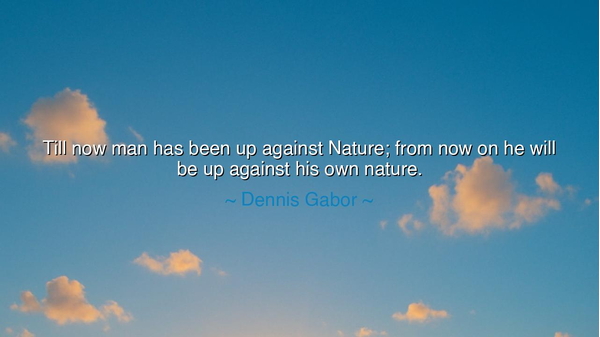
Till now man has been up against Nature; from now on he will be
Till now man has been up against Nature; from now on he will be up against his own nature.






Hear the solemn prophecy of Dennis Gabor, seer of the modern age: “Till now man has been up against Nature; from now on he will be up against his own nature.” These words strike like thunder, for they tell of a turning point in the story of mankind. In the beginning, humanity’s great struggle was survival—against storm and drought, against beasts of the wild, against the cold hand of famine and disease. But now, through knowledge and invention, man has bent much of Nature to his will. He has split the atom, tamed the river, flown beyond the clouds. And yet, in this triumph lies a new peril: that the greatest enemy he must face is no longer outside him, but within his own heart and mind.
For to be “up against his own nature” means that man’s greatest challenge is now the shadow of his desires, his greed, his pride, his restlessness. What are nuclear weapons, if not the fruit of intelligence misused? What is pollution, if not the consequence of appetite without restraint? What is war, if not the failure to master rage and ambition? Gabor, himself a scientist, foresaw that humanity’s power had grown so vast that the true battlefield is no longer the wilderness, but the soul. If man does not learn to govern himself, he will be undone not by the claw of the lion or the flood of the river, but by his own inventions turned against him.
History itself cries this truth. Consider the tale of the Roman Empire, which conquered lands from Britain to the sands of Arabia. For centuries, Rome believed her greatest enemies were the barbarian tribes pressing at her borders. Yet what felled Rome was not the barbarian’s sword, but Rome’s own corruption—luxury without discipline, power without virtue, and leaders without vision. The collapse came from within, proving that no empire, however mighty against Nature, can endure when it is conquered by its own nature.
And what of our own age? We have conquered disease with medicine, distance with machines, ignorance with science. Yet we find ourselves entangled in new chains: anxiety, isolation, greed, division. Technology that could unite has sown discord; abundance that could feed all has deepened inequality. Truly, Gabor’s words echo like an oracle—our struggle now is not against the world outside, but against the impulses within. Unless man learns to discipline his spirit, his very progress becomes his downfall.
But take heart, for this is not a message of despair—it is a summons to greatness. To conquer one’s own nature is a higher victory than to conquer the mountains or the seas. It is the victory of wisdom over ignorance, of compassion over cruelty, of discipline over indulgence. The ancients called this mastery virtue, the harmony of the soul with truth. To fight the storms of the earth was survival; to fight the storms of the heart is salvation.
The lesson is clear: if we would endure, we must turn our gaze inward. Each must ask: Do I rule my desires, or do they rule me? Do I wield my tools wisely, or do they enslave me? The survival of mankind depends not only on innovation, but on character. Let each man and woman cultivate self-mastery, for in mastering ourselves we master the destiny of our species.
Practical steps lie before us: practice restraint where desire tempts you to excess; seek wisdom where ignorance whispers easy answers; cultivate compassion in place of judgment; use power not for vanity, but for service. Begin with yourself, and from there, the world is healed.
Remember always: once man fought the winds and the seas; now he must fight the storms within his own soul. The beasts of the earth have been subdued, but the beast of pride still prowls within. Let us, then, become victors not over Nature, but over our own nature, and in this victory secure a future worthy of all who came before us.






AAdministratorAdministrator
Welcome, honored guests. Please leave a comment, we will respond soon